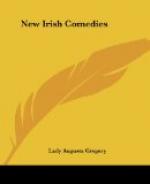[Music: AIR OF “THE HEATHER BROOM!”]
COATS
I find some bald little notes I made before writing Coats. “Hazel is astonished Mineog can take such a thing to heart, but it is quite different when he himself is off ended.” “The quarrel is so violent you think it can never be healed, but the ordinary circumstances of life force reconciliation. They are the most powerful force of all.” And then a quotation from Nietzsche, “A good war justifies every cause.”
DAMER’S GOLD
In a lecture I gave last year on playwriting I said I had been forced to write comedy because it was wanted for our theatre, to put on at the end of the verse plays, but that I think tragedy is easier. For, I said, tragedy shows humanity in the grip of circumstance, of fate, of what our people call “the thing will happen,” “the Woman in the Stars that does all.” There is a woman in the stars they say, who is always hurting herself in one way or other, and according to what she is doing at the hour of your birth, so will it happen to you in your lifetime, whether she is hanging herself or drowning herself or burning herself in the fire. “And,” said an old man who was telling me this, “I am thinking she was doing a great deal of acting at the time I myself made my start in the world.” Well, you put your actor in the grip of this woman, in the claws of the cat. Once in that grip you know what the end must be. You may let your hero kick or struggle, but he is in the claws all the time, it is a mere question as to how nearly you will let him escape, and when you will allow the pounce. Fate itself is the protagonist, your actor cannot carry much character, it is out of place. You do not want to know the character of a wrestler you see trying his strength at a show.
In writing a little tragedy, The Gaol Gate, I made the scenario in three lines, “He is an informer; he is dead; he is hanged.” I wrote that play very quickly. My two poor women were in the clutch of the Woman in the Stars.... I knew what I was going to do and I was able to keep within those three lines. But in comedy it is different. Character comes in, and why it is so I cannot explain, but as soon as one creates a character, he begins to put out little feet of his own and take his own way.
I had been meditating for a long time past on the mass of advice that is given one by friends and well-wishers and relations, advice that would be excellent if the giver were not ignorant so often of the one essential in the case, the one thing that matters. But there is usually something out of sight, of which the adviser is unaware, it may be something half mischievously hidden from him, it may be that “secret of the heart with God” that is called religion. In the whole course of our work at the theatre we have been I may say drenched with advice by friendly




